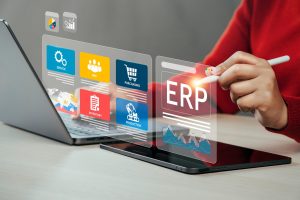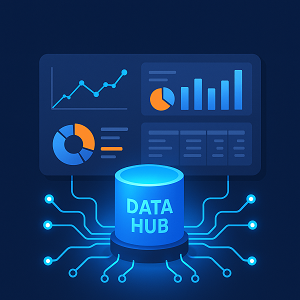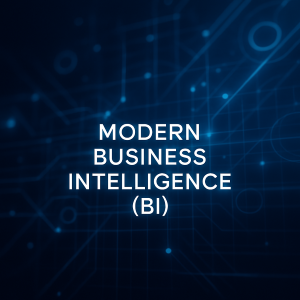ONE HUB. INFINITE INSIGHTS

In today’s data-driven world, a modern data hub isn’t just helpful—it’s mission-critical. It unifies scattered data, simplifies complex information structures, and empowers your business with analytics-ready insights for planning, forecasting, reporting, and AI-driven decision-making.
What the Stratum Data Hub Delivers
Stratum’s data hub makes self-service BI a reality through pre-built analytics and data management functionality that lets you collect data from multiple applications, databases, spreadsheets, and documents into one interface that gives business users the quick insights they need to better run their organizations.
Unified Data from Every Source
The data hub consolidates internal and external data—ERP, CRM, spreadsheets, budgets, customer portals, point-of-sale data, supplier feeds—into a centralized, analytics-ready environment.
Data That’s Always Analytics-Ready
With the Stratum data hub, your data doesn’t just sit there—it’s actively transformed and standardized. A powerful engine ensures that every data view is complete, trusted, and aligned across departments.
This makes it easy for users to work with the data, even if they don’t understand the underlying structure of each system.
Data That’s Enhanced, Enriched, and Augmented
Want more insightful reporting? The Stratum data hub lets analysts enhance their data—filling in gaps, adding attributes, and supplementing product or customer data with valuable external context.
User-Controlled Data Imports
Analysts and citizen data scientists can easily import Sales Plans, Budgets and Forecasts into the Stratum data hub, too – then analyze, compare, collaborate on, and maintain their plans.
Drillable, Actionable Insights
The data hub empowers users to drill from high-level KPIs all the way down to transactional-level detail.
Automated Report Distribution, Alerting & Integration with 3rd-Party Tools
Stay proactive. Stratum doesn’t just uncover insights—it ensures the right people get them, right when they need them. With web-based analysis, interactive dashboards, automated alerts, scheduled report delivery, mobile access, and built-in integration with Excel and Microsoft BI, sharing consistent, timely data has never been easier.
Ready to Transform Your Data Into Actionable Insights?
Relevant Data Hub Articles
Modernizing Analytics and Reports Around Legacy ERP
A pragmatic roadmap for manufacturers and distributors to strengthen data trust, operational visibility, and AI readiness—without disrupting ERP performance Many manufacturers and distributors continue to …
Many manufacturers and distributors continue to …
Top Features To Look For in a Business Analytics & Reporting Solution
AN EXCLUSIVE GUIDE FOR MID-MARKET MANUFACTURERS For mid-market manufacturers, the need for clear, timely business insights is as critical as it is for Fortune 500 companies. Yet limited budgets, leaner teams, and shorter implementation windows often make choosing the right …
For mid-market manufacturers, the need for clear, timely business insights is as critical as it is for Fortune 500 companies. Yet limited budgets, leaner teams, and shorter implementation windows often make choosing the right …
Why a Data Hub Is the Secret Weapon Behind Great Dashboards
 Data visualization tools like Power BI have transformed the way organizations explore and share data. With sleek dashboards and interactive reports, business users can turn numbers into narratives in just a few clicks. But here’s the catch — behind every beautiful …
Data visualization tools like Power BI have transformed the way organizations explore and share data. With sleek dashboards and interactive reports, business users can turn numbers into narratives in just a few clicks. But here’s the catch — behind every beautiful …
What Today's Modern BI Systems Do That Legacy Reporting Tools Can’t
 Analytics and business intelligence (BI) are no longer optional—they’re essential. In today’s fast-moving business landscape, leaders need immediate, trustworthy insights to outpace competitors, spot trends before they escalate into problems, and seize opportunities as they …
Analytics and business intelligence (BI) are no longer optional—they’re essential. In today’s fast-moving business landscape, leaders need immediate, trustworthy insights to outpace competitors, spot trends before they escalate into problems, and seize opportunities as they …
Beyond the Dashboard: Data Management Struggles with Visualization Tools
 Power BI and similar visualization tools excel at providing quick access to business data, but they often fall short when it comes to data management and performance optimization. Even those with built-in data management features can be complex and difficult for …
Power BI and similar visualization tools excel at providing quick access to business data, but they often fall short when it comes to data management and performance optimization. Even those with built-in data management features can be complex and difficult for …
The Power of a Data Hub for BI & Analytics
 In today’s data-driven business environment, organizations generate vast amounts of information from multiple sources. Managing and analyzing this data effectively is crucial for making informed decisions, improving efficiency, and gaining a competitive edge. This is where …
In today’s data-driven business environment, organizations generate vast amounts of information from multiple sources. Managing and analyzing this data effectively is crucial for making informed decisions, improving efficiency, and gaining a competitive edge. This is where …
Integrating AI with BI - The Benefits & Data Challenges
 Business intelligence (BI) has become a cornerstone of enterprise decision-making. Whether delivered through centralized dashboards developed by IT and BI teams or via self-service applications, BI tools are now indispensable for business users. However, the integration of artificial …
Business intelligence (BI) has become a cornerstone of enterprise decision-making. Whether delivered through centralized dashboards developed by IT and BI teams or via self-service applications, BI tools are now indispensable for business users. However, the integration of artificial …
Is Your Structured Data Ready for Analytics & Gen AI?
 This year, both analytics and generative AI (GenAI) adoption reached unprecedented levels. As businesses integrate these insight-generating technologies into daily operations, the spotlight shifts to what drives their success: data. But not just any data. Success depends on …
This year, both analytics and generative AI (GenAI) adoption reached unprecedented levels. As businesses integrate these insight-generating technologies into daily operations, the spotlight shifts to what drives their success: data. But not just any data. Success depends on …
Is Your Data Ready for AI and Analytics?
 Recent studies over the past few years have found that 51% of CEOs consider data challenges the primary obstacle to generating business value with analytics and Artificial Intelligence (AI).
Clean, accurate and reliable data is essential to turning AI and analytics into …
Recent studies over the past few years have found that 51% of CEOs consider data challenges the primary obstacle to generating business value with analytics and Artificial Intelligence (AI).
Clean, accurate and reliable data is essential to turning AI and analytics into …
A Strategic 8-Step Approach to Successful Business Intelligence Deployments
 Management's ability to consistently make timely and accurate business decisions—at both strategic and operational levels—is extremely influential in determining whether the company surpasses, or gets surpassed by, competitors. Yet for too many business executives, decision making is often …
Management's ability to consistently make timely and accurate business decisions—at both strategic and operational levels—is extremely influential in determining whether the company surpasses, or gets surpassed by, competitors. Yet for too many business executives, decision making is often …
20 Essential Financial & Operational KPIs for Manufacturing Businesses
 Performance tracking using metrics and KPIs can often be perplexing for many organizations. KPIs generally track longer-term company goals and are typically more financial or strategic in nature, such as increasing revenue by a certain percentage within a specified …
Performance tracking using metrics and KPIs can often be perplexing for many organizations. KPIs generally track longer-term company goals and are typically more financial or strategic in nature, such as increasing revenue by a certain percentage within a specified …
How Manufacturers Can Leverage AI & Analytics For Strategic Decision-Making
 Across the globe, manufacturing businesses are navigating economic uncertainties with increasing sophistication. Critical to guiding them through today’s fluctuating markets is the accuracy and actionable intelligence derived from data. Insights gleaned from robust data …
Across the globe, manufacturing businesses are navigating economic uncertainties with increasing sophistication. Critical to guiding them through today’s fluctuating markets is the accuracy and actionable intelligence derived from data. Insights gleaned from robust data …
Harnessing Data Analytics to Fuel Business Growth
 Data stands as the cornerstone of the global economy, offering significant leverage to businesses poised for expansion. However, data alone lacks intrinsic value. Without analytical tools and methodologies, navigating through vast amounts of data can be overwhelming. But when …
Data stands as the cornerstone of the global economy, offering significant leverage to businesses poised for expansion. However, data alone lacks intrinsic value. Without analytical tools and methodologies, navigating through vast amounts of data can be overwhelming. But when …
The Advantages of Using Self-Service Business Intelligence (BI) Tools
 In today's data-driven business environment where the volume of business data is constantly expanding, it's crucial for companies to emphasize effective data management and analysis through business intelligence (BI). BI tools are instrumental in enabling businesses to …
In today's data-driven business environment where the volume of business data is constantly expanding, it's crucial for companies to emphasize effective data management and analysis through business intelligence (BI). BI tools are instrumental in enabling businesses to …
How to Successfully Onboard a New Business Intelligence & Reporting Solution
 The right business intelligence and reporting software can significantly enhance business outcomes by giving decision makers greater visibility and insight into sales and operational performance. But getting your whole team psyched up to use and get the most value out of …
The right business intelligence and reporting software can significantly enhance business outcomes by giving decision makers greater visibility and insight into sales and operational performance. But getting your whole team psyched up to use and get the most value out of …
- HOME
- Intro to Silvon and Stratum
- Stratum Data Hub & Analytics
- Data Hub
- Packaged BI
- Planning & Forecasting
- Resources
- Services & Support
- Customer Education